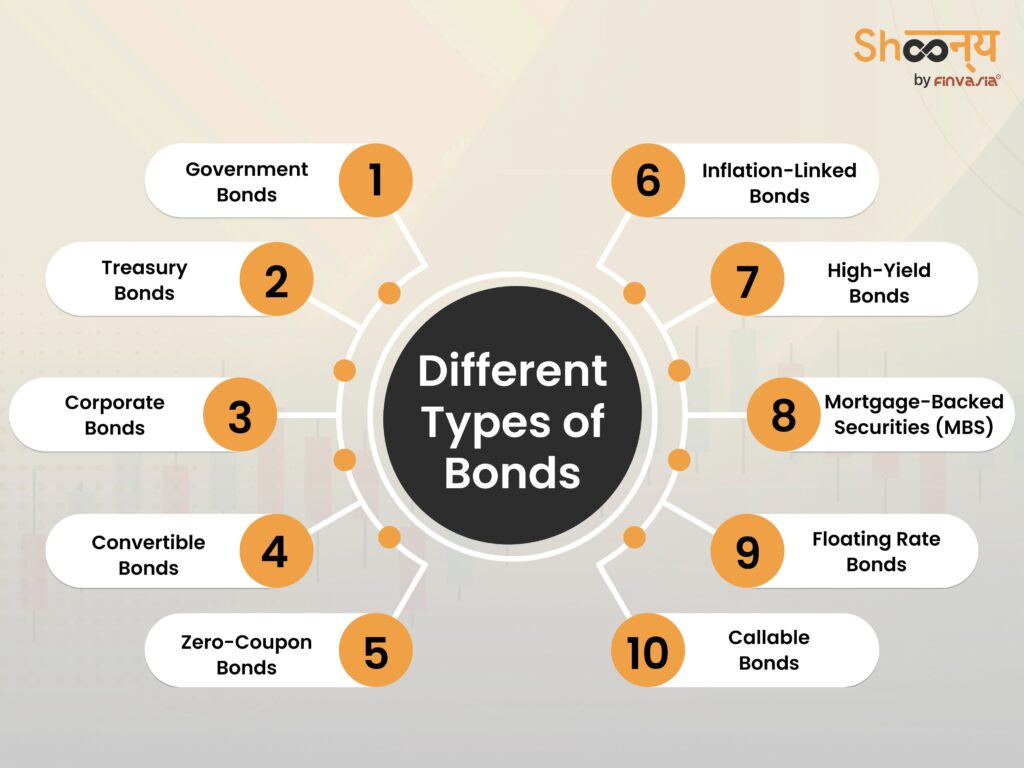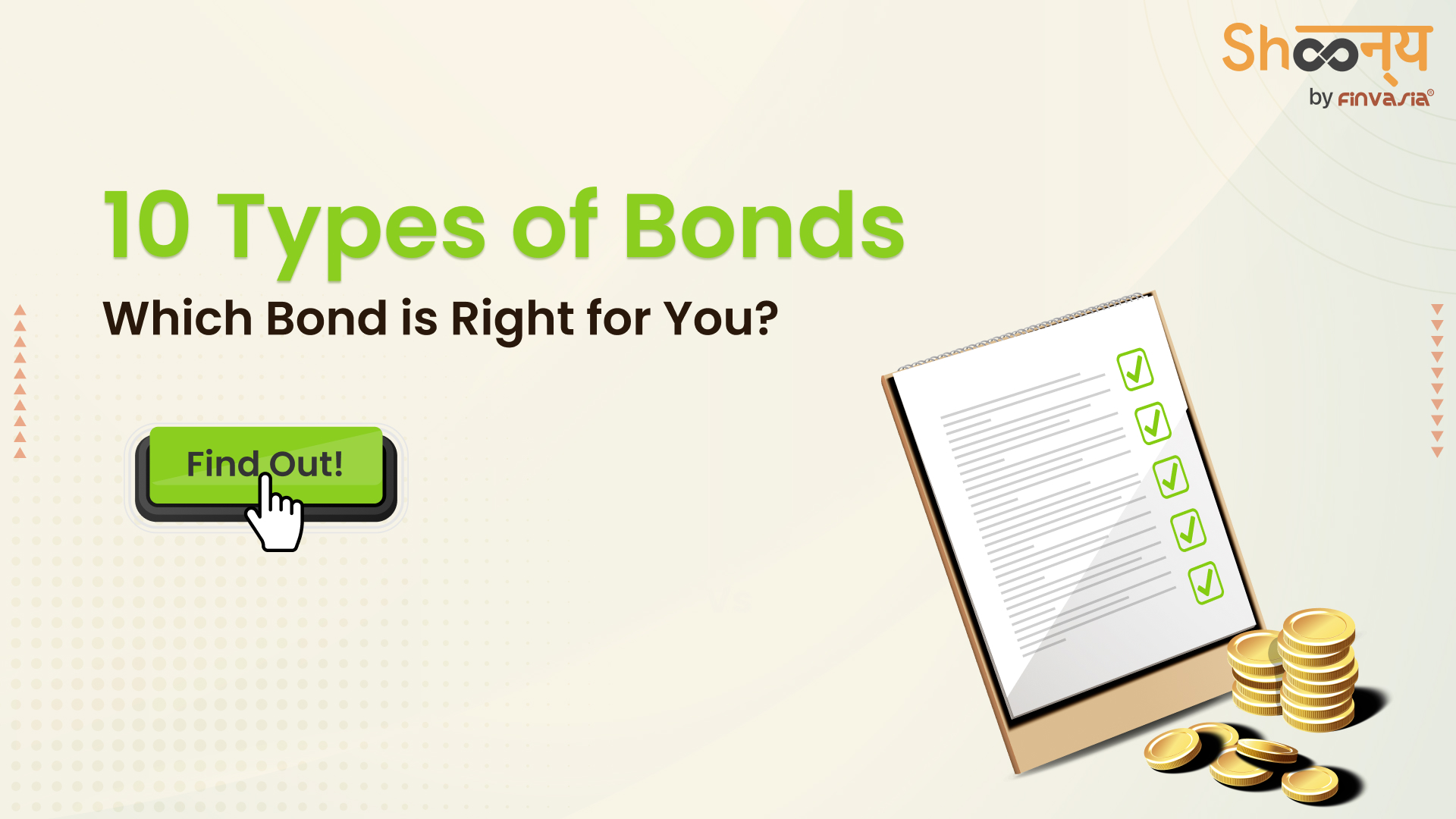When it comes to stock market investing, bonds offer a valuable alternative to stocks. Bonds work on a simple principle: you lend money to a company or government, and they pay you interest regularly, promising to return the full amount by a set date. This arrangement is what we call a bond. But did you know there are various types of bonds in India? How do you choose the right one for your investment?
Today, we will introduce the concept of the bond market and discuss various types of bonds and their features.
Bond Market in India
The bond market is where people trade corporate bonds, government bonds, and tax-free bonds. Unlike the stock market, the bond market tends to be more stable. Investing in bonds is indeed a smart way to diversify your portfolio.
Types of the Bond Markets in India
In India, the bond market can be broadly categorised into two types: the primary market and the secondary market.
Primary Market
In the primary market, new debt securities are initially issued and sold directly to investors. Investment banks play a essential role in facilitating the issue of bonds in the primary market.
Secondary Market
The secondary market involves the trading of existing bonds. You can easily purchase and sell bonds in the secondary market through intermediaries such as brokers. The bond prices in the secondary market fluctuate based on factors such as economic conditions and supply & demand.
Let us take a look at the various types of bonds in India!
Types of Bonds in India

Common bond types that will help you with meaningful portfolio diversification.
Government Bonds
The central or state governments issue government bonds to raise funds for various purposes. These could be liquidity crises or infrastructure development. These bonds are regarded relatively safe investments as the government backs them.
Examples of government bonds in India are sovereign gold bonds, inflation-indexed bonds, and GOI savings bonds.
Treasury Bonds
These are government securities issued by the Central Government to raise funds for public projects. They’re considered a safe bet since they’re backed by the government.
Types of Treasury Bonds in India:
- Treasury Bills (T-Bills): These are short-term securities with maturities of 91 days, 182 days, and 365 days.
- Government Bonds (G-Secs): These are long-term securities with maturities that can range from 1 year to 40 years.
Corporate Bonds
Private or public corporations issue corporate bonds to raise capital. This capital can be used for business operations, expansions, or acquisitions. Investors who purchase corporate bonds essentially lend money to the issuing corporation. They receive fixed interest payments over a specific period.
Corporate bonds offer potentially higher returns compared to government bonds. However, they also carry higher risks.
Convertible Bonds
Convertible bonds are a special type of corporate debt. They pay interest like regular bonds,. However, you can convert them into shares of the company’s stock at certain times. This conversion is usually up to you, the bondholder.
This feature provides the potential to participate in the company’s growth and benefit from stock price appreciation. Convertible bonds offer a unique combination of fixed income and equity exposure.
Zero-Coupon Bonds
Zero coupon bonds, also known as discount bonds, do not pay regular interest. Rather, they are issued at a discount to their face value and redeemed at their full face value upon maturity. The mere difference between the purchase price and the face value represents the investor’s return. Zero coupon bonds are often favoured for capital appreciation.
Inflation-Linked Bonds
Inflation-linked bonds, as the name suggests, provide returns that are linked to inflation rates. The Reserve Bank of India (RBI) issues these bonds, and the interest payments adjust based on changes in the wholesale price index. Investing in inflation-linked bonds can act as a hedge against rising inflation and help preserve purchasing power.
High-Yield Bonds
These are often called junk bonds. High-yield bonds are issued by companies with lower credit ratings. These offer higher yields to attract investors. The higher return compensates for the increased risk of default. If you’re willing to take on more risk, high-yield bonds might offer better returns.
Mortgage-backed securities (MBS)
Mortgage-backed securities are created by pooling together a bunch of mortgages and then issuing bonds based on this pool. The money you receive from these securities comes from the mortgage payments made by homeowners. Because they’re backed by real estate, they generally carry less credit risk. Thus, they are a bit safer, though still subject to fluctuations in the real estate market.
Floating Rate Bonds
Floating rate bonds have interest rates that adjust periodically based on a reference rate, like the Reserve Bank of India’s repo rate. This means that the interest payments on this type of bond change with respect to market interest rates.
This feature helps protect investors from interest rate risk because the bond’s rate moves in line with market rates.
Callable Bonds
Callable bonds are defined as the category that gives the issuer the right to redeem the bonds before their maturity date. This feature offers the advantage of lower interest rates in the market. However, from an investor’s perspective, callable bonds do carry the risk of early redemption.
Invest in different types of bonds at zero brokerage!
Features of Bonds
Bonds are a safe investment choice for investors.
Here’s a quick look at what makes them different from other investment options:
Interest Rate: It’s a fixed percentage of the bond’s face value and is paid out to you periodically during the bond’s life.
Face Value: This is the amount you’ll get back from the issuer when the bond matures. It’s also known as the par value of the bond.
Maturity Date: It is the date when the bond is due for repayment. On this date, the issuer pays back the bond’s face value to you, and the bond officially “matures.”
Yield: This represents the total return you can expect if you hold the bond until it matures.
Issuer: This represents the entity that issues the bond and is responsible for paying back both the principal and the interest.
Credit Rating: This rating, assigned by credit agencies, reflects how likely the issuer is to repay the bond.
Read now- Top credit rating agencies in India!
A higher rating means a lower risk of default.
Liquidity: This refers to how easily you can buy or sell a bond in the secondary market before it matures. A bond with good liquidity is easier to trade.
Advantages of Bonds
Investment in bonds in India offers you several advantages:
- Stable Income: They provide regular interest payments.
- Lower Risk: Bonds are generally less volatile than stocks.
- Predictable Returns: Bonds usually have a fixed term and interest. They are suitable for someone who wishes to make safe investments.
- Diversification: Adding types of bonds to your investment portfolio can help balance out the risky investments.
Limitations of Bonds
Even though bonds have their benefits, there are some drawbacks:
- Interest Rate Risk: Bond prices can drop when interest rates go up, which might lead to losses if you sell before maturity.
- Inflation Risk: Inflation can reduce the real value of the fixed interest payments you receive.
- Credit Risk: There’s always the chance that the bond issuer could default on their payments.
- Lower Returns: Compared to stocks, bonds often offer lower returns, which might not keep pace with inflation.
Things to Consider Before Investing in Bonds
Planning to invest in various types of bonds?
Here are a few things you must keep in mind!
- Credit Rating: You must check the bond issuer’s creditworthiness to understand the risk of default.
- Interest Rate Environment: These have a great impact on bond prices. You must be aware of current interest rates.
- Maturity: Different types of bonds have different maturity dates. Bonds with longer maturities carry more risk; however, they generally offer higher yields.
On the flip side, short-term bonds offer lower returns. But, they are subject to fluctuations in interest rates.
- Liquidity: The various types of bonds also differ in terms of liquidity. Thus, you must do proper research.
- Tax Implications: Consider how the bond’s interest is taxed, as some bonds might offer tax benefits.
Conclusion
Understanding these various types of bonds in India will help you diversify your portfolio smartly. Whether opting for government-backed security or higher-yielding corporate bonds, each type offers unique benefits and risks.
However, you must do proper research before investing in the bonds!
FAQs| Types of Bonds in India
The most popular types of bonds include government bonds, corporate bonds, municipal bonds, and treasury bonds.
Some of the bonds that are usually considered safe include Government bonds, especially treasury bonds.
The five types of bonds are Government Bonds, Corporate Bonds, Zero-Coupon Bonds, Tax Saving bonds and Convertible Bonds.
The 7 types of bonds in India are Government Bonds, Corporate Bonds, Convertible Bonds, Zero-Coupon Bonds, Inflation-Linked Bonds, RBI Bonds, and Sovereign Gold Bonds.
Bonds in India vary by the issuer (government, PSUs, corporates), tenure (short to long-term), coupon (fixed, floating, etc. and security.
Source: TheEconomicTimes, SEBI
______________________________________________________________________________________
Disclaimer: Investments in the securities market are subject to market risks; read all the related documents carefully before investing.

